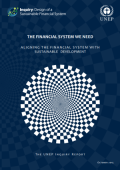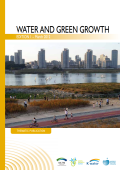
Countries in Sub-Saharan Africa (SSA) have experienced dramatic economic growth in the past decade, with six of the ten fastest growing economies in the world found in SSA between 2000 and 2010. Economic growth is critical to continued development and poverty reduction, but can have, as has already become visible in the region, significant environmental costs and can even hinder further long term economic growth and development, if environmentally unsustainable growth paths are continued. However greener growth is needed to allow SSA countries to continue to develop, while avoiding or reducing negative environmental impacts.

This report is the first major output of a project on Water and Green Growth, led by the Government of the Republic of Korea and the World Water Council (WWC). It is the result of over 12 months of research and analysis by an international group of experts. It provides an analysis of 26 case studies that illustrate various aspects of water and green growth, and then uses the analysis to recommend a draft framework for policymakers.
This article examines the potential contribution of household scale off-grid renewable energy generation to the post-carbon economy. The large-scale focus of the green jobs agenda in high-income countries obscures how small-scale technologies can be a transformative source of employment in developing economies. Debates about what constitutes a green job and their value leaves out the everyday practice of green livelihoods carried out by the urban poor across the African continent in unfavourable institutional contexts where nonrenewable fuel is subsidised and renewable energy inputs are heavily taxed. The article presents experiences from field work in several countries, including Egypt, Nigeria and Kenya to provide practical examples of communities pursuing strategies of income generation, community empowerment and environmental preservation. It argues that scholars and practitioners concerned with both social justice and environmental preservation should embrace a definition of green jobs that is bottom-up or people-centred.
By presenting a selected number of successful national experiences from 2012, the progress report illustrates the different levels at which the International Labour Organization (ILO)'s Green Jobs Programme operates. The report also provides an update on the activities which will unfold in 2013 with the continued support of the Programme’s networks and partners.
This report includes case studies on Mexico, Kenya, Thailand, South Africa, the Dominican Republic, China, Turkey, Zambia and Indonesia.
